Coronavirus: 'Baffling' observations from the front line
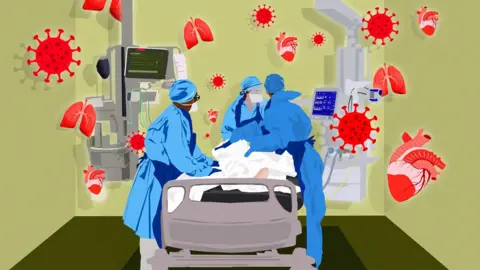 BBC
BBCWhen you talk to intensive care doctors across the UK, exhausted after weeks of dealing with the ravages of Covid-19, one phrase emerges time after time: "We've never seen anything like this before."
They knew a new disease was coming, and they were expecting resources to be stretched by an unknown respiratory infection which had first appeared in China at the end of last year.
And as the number of cases increased, doctors up and down the UK were reading first-hand accounts from colleagues in China, and then in Italy - in scientific journals and on social media - about the intensity of infection.
"It felt in some ways like we were trying to prepare for the D-Day landings," says Barbara Miles, clinical director of intensive care at Glasgow Royal Infirmary, "with three weeks to get ready and not a great deal of knowledge about what we would be facing".
But what arrived in the UK as winter turned into spring took even the most experienced ICU specialists by surprise.
Most people infected with the coronavirus have only mild symptoms, or sometimes none at all. But in many thousands of patients who fall critically ill, Covid-19 is a disease of alarming complexity.
What follows is a summary, often in their own words, of what doctors have learnt about how Covid-19 attacks the human body, and what they still need to know.


More than viral pneumonia
"I think most clinicians were expecting a respiratory virus that causes pneumonia," says Prof Anthony Gordon, a consultant on the intensive care unit at St Mary's Hospital, Paddington, "something similar to diseases like seasonal flu on a much bigger scale".
But, he says, it became apparent very quickly that it was affecting far more than just people's breathing.
Viral pneumonia is a nasty disease - a serious infection of the lungs which causes inflammation as the body fights against it.
But the worst cases of Covid-19 have been something new.
"The volume of this is, of course, unprecedented in the era of modern medicine," says Ron Daniels, an intensive care consultant at hospitals in Birmingham.
"But it's also the type of illness which is so distinct, and the way it's really different from almost every other patient that we've ever seen before."
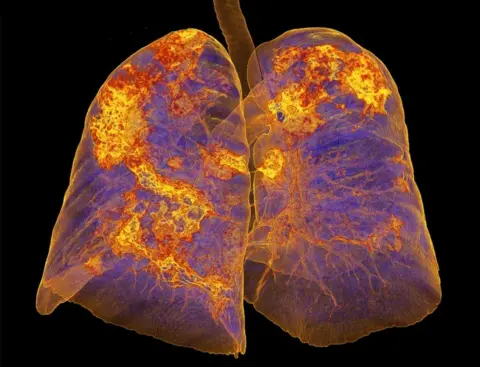 Science Photo Library
Science Photo LibraryFor the critically ill, this is a disease of such severe inflammation and blood clotting that it attacks multiple organs and causes life-threatening problems that cascade around the body.
"As a doctor it seems at times quite horrific, we have had so many very, very sick patients who are having these profound changes in their body en masse," says Beverley Hunt, a professor of thrombosis - the clotting of the blood - who works in intensive care at a leading London hospital.
"We're all struggling to understand it better and it's absolutely key that we get more research done so we can understand what is going on."


Oxygen
As the virus began to spread more rapidly in the UK throughout March, patients started arriving in hospitals because they were breathless and short of oxygen. But many of the most seriously ill - such as those who were admitted to intensive care - often had problems with other organs, not just their lungs. And their blood was acting in ways that have yet to be fully explained.
"We still don't really know why some patients feel OK to begin with, even though they have incredibly low levels of oxygen in their blood," says Prof Hugh Montgomery, a consultant in critical care at the Whittington Hospital in north London.
Doctors measure what they call oxygen saturation - the percentage of haemoglobin molecules in the blood that are carrying oxygen. Usually the aim with patients who are unwell is to keep it at 90% or above. But in some Covid-19 patients the levels drop quite a lot further, down to 80% and sometimes considerably lower than that.
Normally that is enough to set serious alarm bells ringing, but a number of patients appeared to be functioning relatively well with remarkably low levels of oxygen. "It may be related to the inflammation which is affecting the blood vessels," says Anthony Gordon. "It's stopping the oxygen getting into the blood, and that's what's leading to the low levels. But the lungs themselves are not so affected in the early stages."
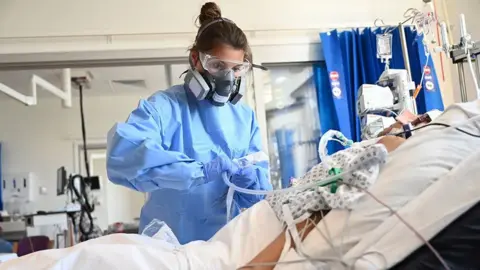 Getty Images
Getty ImagesIt is one of the many mysteries of Covid-19 on which more research is urgently required. And it's led many doctors to question whether mechanical ventilation, to help patients breathe, is always the right course of action for this disease. To be connected to a ventilator, a patient has to be rendered unconscious and a tube has to be inserted into their main airway. This process has saved many seriously ill Covid-19 patients.
But for some, the focus on the lungs may have been the wrong treatment at the wrong time.
"The disease appears to go through different stages," notes Barbara Miles, "and so knowing more about how to use the breathing machines on these patients at different stages of the illness would be something I hope we will learn as time goes on."
Normally, patients who are seriously ill with viral pneumonia have to be on a ventilator for about a week. With Covid-19, a week is often not enough. "We've been seeing people on a ventilator for much longer than that, and we don't quite understand why that is," observes Prof Danny McAuley, an ICU consultant at the Royal Victoria Hospital in Belfast.
"It may be that there is still untreated virus continuing to cause damage. Or it may be that it's a response to the virus, with all the excessive inflammation causing multiple problems in the body." And many of those problems appear to be connected to the blood.


Inflammation and blood clots
Everyone agrees that unprecedented levels of inflammation in the lungs make this a very different disease. When the lining of blood vessels gets inflamed, the blood is more likely to clot. And Covid-19 creates incredibly thick sticky blood in seriously ill patients.
"We find small clots in the small arteries of the lungs but also big clots in the big arteries of the lungs," says Hugh Montgomery. "More than 25% of patients have significant clots and this is a real problem." And the stickier the blood, the bigger the problem.
"You're much more prone to having deep vein thrombosis," explains Beverley Hunt, which usually means a blood clot in your leg. "And pulmonary embolism, when one of the deep vein thromboses travels around the body and blocks the blood supply to the lungs, adding to the problem of the pneumonia."

Coronavirus in the UK
- 31 December: World Health Organisation first informed by China of "pneumonia of unknown cause"
- 31 January: First positive cases of coronavirus infection announced in the UK
- 2 March: First known coronavirus death in the UK, according to NHS England
- 23 March: Government imposes lockdown across the country
- 2 April: Suspected Covid-19 hospital admissions peak in UK at more than 3400 in a single day
- 10 April: 980 deaths announced in the UK, the highest daily figure involving confirmed Covid-19 cases
- 20 May: 250,908 positive Covid-19 cases and 36,042 deaths of positive cases across the UK so far

Blood clots also prevent proper circulation of the blood to other organs like the heart and the brain, making it far more likely that seriously ill Covid-19 patients could suffer a heart attack or a stroke. And some of the warning signs about blood clotting have astonished doctors.
The main protein in the blood which forms blood clots is called fibrinogen.
"Normally," says Beverley Hunt, "it's somewhere between two and four grams per litre in your blood. It goes up a bit in pregnancy, but what we're getting with Covid is as high as 10 to 14 grams per litre. I've never seen that in all my years as a doctor."
Another measure of the risk of clotting, a blood protein known as D-dimer, has also been off the scale. "In a healthy patient, levels are measured in the tens or hundreds," says Hugh Montgomery. "With Covid it's not been at all unusual to be seeing levels of 60, 70 or 80,000, which is quite unheard of."


Immune system and other organs
In some cases, such extraordinary numbers must be due to the presence of multiple clots. But D-dimers can also be a marker of an infection so severe that it triggers a lethal over-reaction from the body's immune system.
Cytokines are small molecules produced by the body as part of its defence against infection. A chemical warning system. They lead to inflammation, and up to a certain level that is good for you. It allows you to fight an infection and hopefully get rid of it.
But in some patients, Covid-19 provokes what is known as a cytokine storm.
"The problem," says Anthony Gordon, "is that if the infection overwhelms the response, you get a massive release of these inflammatory markers. They then cause even more excessive inflammation, which leads not just to the breathing problems we've talked about, but damage to the body's other organs."
One focus of study in seriously ill patients is that the number of T-cells - important blood cells in the immune system - appears to be lowered dramatically during the cytokine storm. Researchers hope that boosting T-cell numbers will aid recovery.
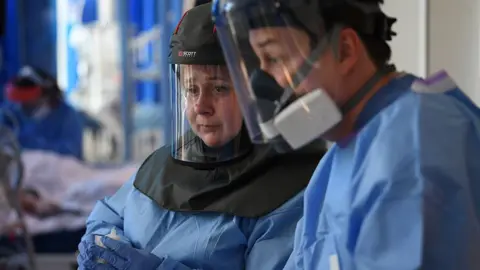 Getty Images
Getty ImagesBut all of these factors add up to Covid-19 being highly unpredictable - it is what specialists call a multisystem disease. That makes it much harder to know how best to treat any individual patient, and at the moment there is no textbook to tell doctors what to do.
"It's not just the lungs being affected," says Hugh Montgomery, "it's the kidneys, the heart, the liver. We've also seen severely inflamed muscle which is doing a lot of damage." More than 2,000 Covid patients admitted to intensive care have suffered kidney failure.
We've been giving patients dialysis machine support," says Barbara Miles. "But the blood flowing through the machines clots far more readily than we're used to, so we've had to give them increased amounts of blood thinning medication as well."
In a growing number of patients, the brain has also become a serious cause for concern among senior doctors who've been exchanging information on a daily basis for weeks. "We now know that large numbers of patients are having significant inflammation of the brain," observes Hugh Montgomery.
"The inflammation presents with everything from delirium and confusion, even more than we would normally expect in ICU, to fits and what we call diffuse encephalitis."
"That means some people not waking up properly after being taken off a ventilator."
It is a litany of challenges, and doctors are desperate to know exactly why and how all these different parts of the body are being so badly affected.
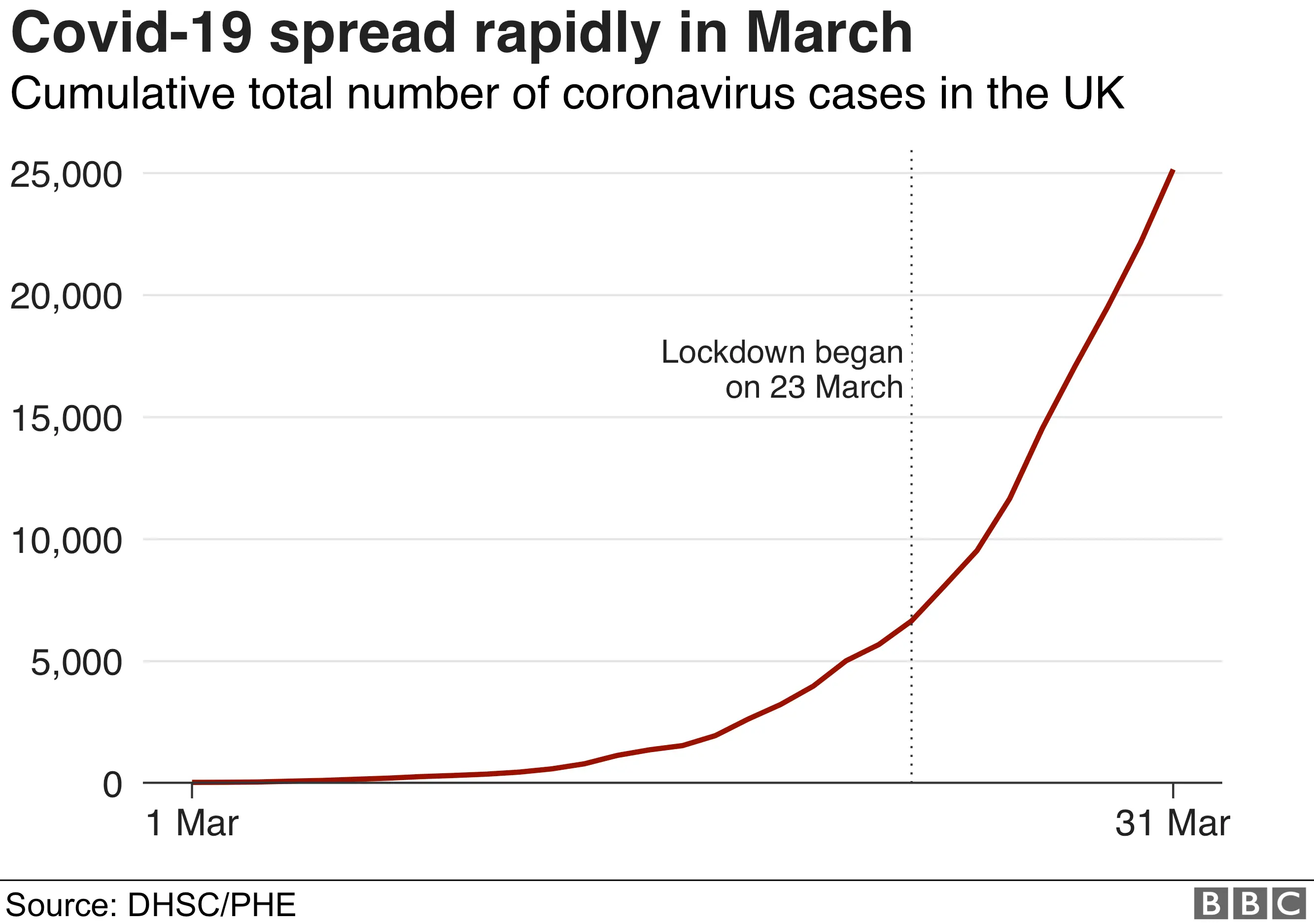
Lack of oxygen and damaged blood vessels are clearly part of the equation. But evidence is mounting that many organs are being attacked by the virus directly, and it is striking that the most common underlying conditions involved with Covid-19 are not respiratory problems like asthma.
Instead, they are vascular conditions that affect the veins and the arteries - high blood pressure, diabetes and heart disease, along with associated factors such as gender, obesity and in particular old age.
According to the Intensive Care National Audit and Research Centre, more than 70% of patients admitted to critical care units in England, Wales and Northern Ireland have been male, and more than 70% have been overweight or obese.
More than two thirds of those who have died in intensive care have been over the age of 60.


Some people and not others
But that still doesn't entirely explain why so many people infected with this coronavirus have only mild symptoms or even no symptoms at all, while others become dangerously ill very quickly.
"We've yet to fully understand this condition, it is baffling," admits Ron Daniels, pointing out that even in intensive care, patients present in a variety of different ways. "We can have a patient in their 70s who has isolated respiratory failure and just needs a bit of help with a ventilator. And we can have a patient in their 20s who develops multi-organ failure very quickly."
In the absence of solid proof, many theories are being discussed, based on observation of patients, and much research is being done. Many ICU doctors think it is highly likely that genetics plays a part in some people becoming critically ill with Covid-19, but they can't yet say for sure.
"It could be partly responsible for the disproportionate effect it has had on people of African and Asian origin," says Ron Daniels. "It may also be responsible for the differences in the response of individuals."
It is possible, for example, that the genetic variation that makes you more susceptible to getting high blood pressure or diabetes also makes you more susceptible to the virus.
 Getty Images
Getty ImagesOne leading theory focuses on ACE-2, a protein which sits on the surface of many types of cells and helps regulate blood pressure. It is ACE-2 that the coronavirus uses to enter the body and infect healthy cells. Some people may be genetically predisposed to having more ACE-2 receptors in their body, and may therefore be more likely to fall seriously ill with Covid-19.
Further evidence to support this theory can be found in the number of seriously ill patients who develop gut problems, which suggests the virus can also attack the lower digestive tract where there are plenty of ACE-2 receptors. It looks likely that ACE-2 is also responsible for the high incidence of kidney failure.
For now, though, there are as many questions as answers.
Barbara Miles says dealing with Covid-19 has been the steepest learning curve of her career. "We'd like to know more about how to treat and prevent blood clots in these patients - what's the optimum treatment to try to prevent them and the optimum treatment if they occur," she says.
Getting the right balance between different kinds of drugs is absolutely vital - trying to solve one problem can sometimes create another. "We don't really know exactly how much therapy to give and for how long to give it. But that will hopefully come as we gain more experience of this condition."


Trials
Similar responses emerge to a series of questions that ICU consultants have been grappling with, even as the number of patients in intensive care has fallen again:
- When is the right time to mechanically ventilate patients with Covid-19?
- What might be the best antiviral drugs to use, and what might be the right dose of anti-inflammatory or immune-suppressing drugs to prescribe?
- Could the idea of using convalescent plasma - antibodies from the blood of patients who have recovered - be part of the solution?
"We've multiple anecdotal reports that say this works or that works," says Danny McAuley. "And really the only way to know the correct answer to this new disease is to do large clinical trials over the next few months." A huge number of such trials are already taking place - there are 41 'nationally prioritised' studies being funded in the UK alone - as doctors prepare for the possibility of the virus returning in a second surge.
There is frustration in some quarters that trials aren't being approved quickly enough, but the UK is a world leader in medical research. And the more doctors know, the better they can treat Covid-19.
They know the failure of lungs has certainly been the biggest cause of Covid deaths in intensive care, but it is not the only one. That means what has been done in the past may not always be the right thing to do for this particular illness.
"It's been almost medieval," says Beverley Hunt as she describes the challenges of the past three months. The best ICU doctors in the land have had to make educated guesses about a disease they have never encountered before. For much of the time they have had to base their medicine on observation, rather than on knowledge gained from previous experiments and existing data.
And one of the greatest clinical challenges in dealing with Covid-19 in the future is to improve the outcome for patients admitted to intensive care.
"We've learnt an awful lot and the teamwork has been amazing, but I've struggled," says Anthony Gordon, who has worked on intensive care wards for more than 20 years. "At times I've come home thinking I really don't know if what I did today was the right thing.
"We're having to learn in a few months what we've learnt over many hundreds of years for other diseases, and that has been a real challenge."
Additional reporting Oliver Barnes

- A SIMPLE GUIDE: How do I protect myself?
- AVOIDING CONTACT: The rules on self-isolation and exercise
- HOPE AND LOSS: Your coronavirus stories
- LOOK-UP TOOL: Check cases in your area
- TESTING: Can I get tested for coronavirus?

Images by Emma Lynch
